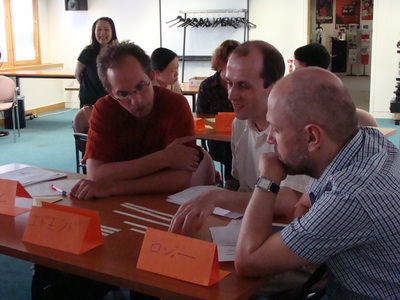you are here:
Home » News » Japan's Past Meets the Present
Japan's Past Meets the Present
30/06/2009
 |
|
The class in action |
June saw the latest instalment in our Talking Contemporary Japan series; this time entitled 'Japan's Past Meets the Present'. Every Thursday, advanced Japanese language learners were transported back through the centuries, taking in aspects of Nara, Heian and Edo period Japan and investigating the links between those eras and the present day.
Their journey began in Heian Japan with 'Iroha' - the old Japanese alphabet. Through the study of this writing system, participants were able to translate old Japanese proverbs, some of which are over 1,000 years old. They were also interested to discover the similarities between UK and Japanese proverbs, for example, the Japanese equivalent of "Water off a duck's back" being "Water on a frog's face!"
The second week focussed on the story of 'Urashima Taro', which was shown in Kamishibai style (story-telling through a series of pictures). This old Japanese folk story is very well known in Japan, in the same way that stories such as Cinderella and Snow White form part of the upbringing of children in the UK. Knowledge of traditional stories such as this allowed the participants to gain a greater understanding of popular Japanese culture.
In the third and fourth weeks the main topic was the Tale of Genji, a classic work of Japanese literature. By reading the story and studying its background, participants were able to discuss the tale and how the issues relate to the present day.
In addition, the use of games, quizzes, discussion, group reading, manga and ghost stories made for a very interesting four weeks. Joachim Kolb, one of the course participants, stated that:
"The course has been a pleasure to attend; educational, informative and well-taught. I am looking forward to the next series!"
Thank you to everyone involved for making these classes such a success. Please look out for information on the website regarding the next free course which will be held later in the year.
|
|




 Japanese Language Navigation
Japanese Language Navigation
